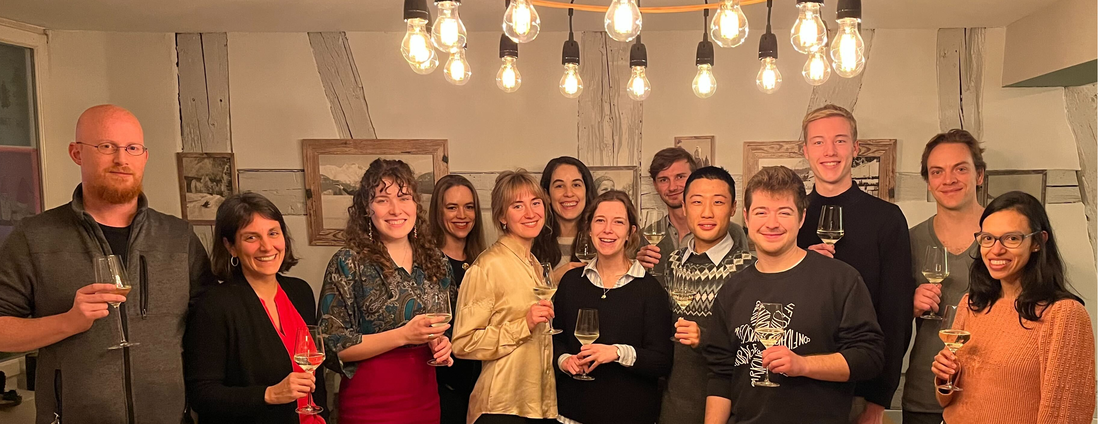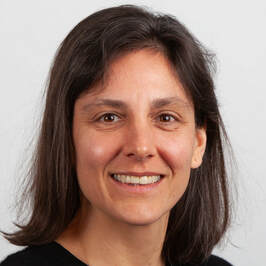
Anita Narwani, PhD - Group Leader
email: [email protected]
My research aims to determine the mechanisms of species coexistence and the impact of biodiversity on ecosystem properties. I am an empiricist, and I use numerous approaches in my research, spanning the range from careful manipulations of biodiversity in lab microcosms, to whole-ecosystem manipulations and data-synthesis. My curiosity about how species coexist has focused, so far, on how environmental variation in resources and temperature determine the strength and outcome of competition. Recently, I have been investigating how these factors influence species' metabolism, growth and evolution.
Short Bio
2020: Group Leader in the Aquatic Ecology Department at Eawag (with tenure)
2015: Group Leader in the Aquatic Ecology Department at Eawag (tenure-track)
2014-2015: Eawag Postdoc Fellowship
2011-2014: Postdoc @ University of Michigan with Brad Cardinale
2011: PhD @ University of Victoria with Asit Mazumder
email: [email protected]
My research aims to determine the mechanisms of species coexistence and the impact of biodiversity on ecosystem properties. I am an empiricist, and I use numerous approaches in my research, spanning the range from careful manipulations of biodiversity in lab microcosms, to whole-ecosystem manipulations and data-synthesis. My curiosity about how species coexist has focused, so far, on how environmental variation in resources and temperature determine the strength and outcome of competition. Recently, I have been investigating how these factors influence species' metabolism, growth and evolution.
Short Bio
2020: Group Leader in the Aquatic Ecology Department at Eawag (with tenure)
2015: Group Leader in the Aquatic Ecology Department at Eawag (tenure-track)
2014-2015: Eawag Postdoc Fellowship
2011-2014: Postdoc @ University of Michigan with Brad Cardinale
2011: PhD @ University of Victoria with Asit Mazumder
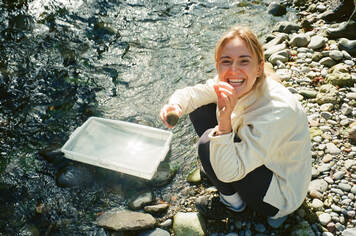
Divina Ryf, MSc student
email: [email protected]
I am doing my Master's thesis at the University of Zurich, co-supervised by Anita Narwani and Frank Pennekamp. Along with my team-mate and fellow MSc student, Li Zhao, we have isolated many populations of the freshwater diatom, Fragillaria crotonensis and I am investigating the extent of local adaptation in resource use traits. In particular I am investigating the requirements of this species for phosphorus, how these requirements are affected by temperature, and the extent to which they show signs of local adaptation. In other words, are the resource requirements of each population well-matched to the conditions of the lake from which they were isolated.
email: [email protected]
I am doing my Master's thesis at the University of Zurich, co-supervised by Anita Narwani and Frank Pennekamp. Along with my team-mate and fellow MSc student, Li Zhao, we have isolated many populations of the freshwater diatom, Fragillaria crotonensis and I am investigating the extent of local adaptation in resource use traits. In particular I am investigating the requirements of this species for phosphorus, how these requirements are affected by temperature, and the extent to which they show signs of local adaptation. In other words, are the resource requirements of each population well-matched to the conditions of the lake from which they were isolated.
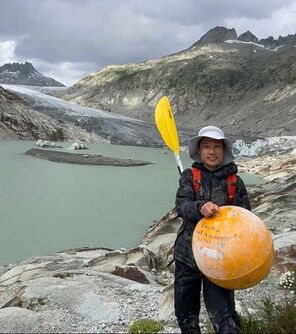
Li Zhao, MSc student
email: [email protected]
I am doing my Master's thesis at ETH Zurich, co-supervised by Anita Narwani and Jukka Jokela. I am investigating local adaptation in thermal traits of the freshwater diatom, Fragillaria crotonensis. In particular I am interested in the populations' thermal optima, minimum and maximum critical temperatures, and how these traits are affected by resource limitation. In particular, we are studying the effects of phosphorus, as lake in Switzerland have experience re-oligotrophication in recent decades. As a result, lakes are becoming more phosphorus poor as they warm, and I am interested in understanding how this may influence the ability of species to locally adapt to their local thermal conditions.
email: [email protected]
I am doing my Master's thesis at ETH Zurich, co-supervised by Anita Narwani and Jukka Jokela. I am investigating local adaptation in thermal traits of the freshwater diatom, Fragillaria crotonensis. In particular I am interested in the populations' thermal optima, minimum and maximum critical temperatures, and how these traits are affected by resource limitation. In particular, we are studying the effects of phosphorus, as lake in Switzerland have experience re-oligotrophication in recent decades. As a result, lakes are becoming more phosphorus poor as they warm, and I am interested in understanding how this may influence the ability of species to locally adapt to their local thermal conditions.
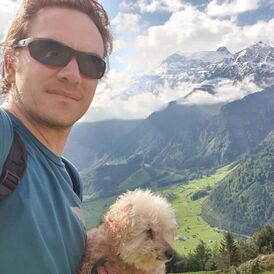
Patrick Thomas, PhD - Postdoctoral Fellow
email: [email protected]
I am broadly interested in how the biodiversity of phytoplankton communities influences aquatic ecosystem functioning, both in natural and engineered systems. For my masters’ thesis, I tested how algal diversity influences nutrient removal and biomass productivity in an industrial system using dairy wastewater to cultivate algae. My PhD focused on how intraspecific trait variation in marine phytoplankton shapes productivity, and how variation in algal food quality can influence trophic transfer to zooplankton.
In my current work at Eawag, I am 1) joining a project testing how algae respond at the metabolic level to interactive effects of temperature and resource availability, and 2) starting a new project which tests how the chemical compounds released by algae into the water (i.e., the exometabolome) influence coexistence and productivity among species, and also tests which environmental factors select for the extracellular excretion of such compounds. With this work, I hope to improve our understanding of chemically-mediated interactions in freshwater green algae, and to generate insights into ecologically sound strategies of cultivating algae for sustainable food and fuel.
email: [email protected]
I am broadly interested in how the biodiversity of phytoplankton communities influences aquatic ecosystem functioning, both in natural and engineered systems. For my masters’ thesis, I tested how algal diversity influences nutrient removal and biomass productivity in an industrial system using dairy wastewater to cultivate algae. My PhD focused on how intraspecific trait variation in marine phytoplankton shapes productivity, and how variation in algal food quality can influence trophic transfer to zooplankton.
In my current work at Eawag, I am 1) joining a project testing how algae respond at the metabolic level to interactive effects of temperature and resource availability, and 2) starting a new project which tests how the chemical compounds released by algae into the water (i.e., the exometabolome) influence coexistence and productivity among species, and also tests which environmental factors select for the extracellular excretion of such compounds. With this work, I hope to improve our understanding of chemically-mediated interactions in freshwater green algae, and to generate insights into ecologically sound strategies of cultivating algae for sustainable food and fuel.
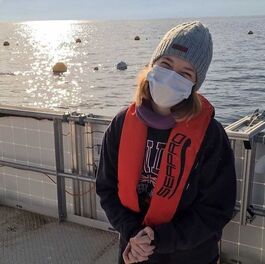
Sarah Levasseur, PhD student - ETH Zurich
email: [email protected]
My interests lie in phytoplankton communities, their biodiversity, and their responses to climate change. My PhD is focused on determining the extent to which warming alters essential resource requirements and elemental stoichiometry in freshwater phytoplankton. I aim to improve our mechanistic understanding of how such changes may influence competitive species interactions, community assembly and ecosystem functioning under warming. The work is mainly empirical, with lab microcosms and outdoor mesocosms, but it will also incorporate a model-based approach to assess how well the traits measured from my experiments predict community structure and species dominance in the context of climate change.
email: [email protected]
My interests lie in phytoplankton communities, their biodiversity, and their responses to climate change. My PhD is focused on determining the extent to which warming alters essential resource requirements and elemental stoichiometry in freshwater phytoplankton. I aim to improve our mechanistic understanding of how such changes may influence competitive species interactions, community assembly and ecosystem functioning under warming. The work is mainly empirical, with lab microcosms and outdoor mesocosms, but it will also incorporate a model-based approach to assess how well the traits measured from my experiments predict community structure and species dominance in the context of climate change.
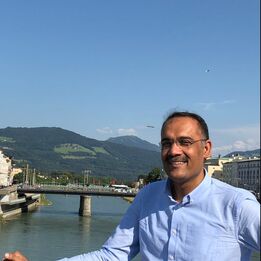
Imran Khaliq, PhD - BGB and BAFU Posdoctoral Fellow
email: [email protected]
I am an ecologist and broadly interested in biodiversity. I work on species’ distributions both in spatial and temporal dimensions. In my work, I integrate species distributional, morphological, physiological, ecological and phylogenetic data to understand species responses to climate change. For the past few years, my focus has been on understanding the role of species’ physiology in determining their distribution and to predict species' responses to future climate change. In the Narwani and Rixen (WSL) groups, as a BGB postdoc, my focus is to study warming-related community turnover in terrestrial and aquatic ecosystems. The main aim of the project is to identify the drivers of this turnover at local as well at global scales in both blue and green realms. This project will enhance our understanding of community responses to changing climatic conditions and enable us to estimate the vulnerability of terrestrial and aquatic ecosystems.
email: [email protected]
I am an ecologist and broadly interested in biodiversity. I work on species’ distributions both in spatial and temporal dimensions. In my work, I integrate species distributional, morphological, physiological, ecological and phylogenetic data to understand species responses to climate change. For the past few years, my focus has been on understanding the role of species’ physiology in determining their distribution and to predict species' responses to future climate change. In the Narwani and Rixen (WSL) groups, as a BGB postdoc, my focus is to study warming-related community turnover in terrestrial and aquatic ecosystems. The main aim of the project is to identify the drivers of this turnover at local as well at global scales in both blue and green realms. This project will enhance our understanding of community responses to changing climatic conditions and enable us to estimate the vulnerability of terrestrial and aquatic ecosystems.

Vanessa Weber de Melo, PhD - Posdoctoral Fellow
email: [email protected]
In my research, I investigate how organisms respond to changes in their environment, exploring different response scales, ranging from molecular up to population-level processes. I use multiple microbial species as model systems to answer these questions. Besides being fascinating creatures, microorganisms grow fast, can be easily manipulated in the lab, and have central functions in all ecosystems. In my current project in the Narwani Group, I will explore the interaction between temperature and resource limitation in a range of phytoplankton species. I will monitor metabolic responses to these environmental conditions using novel high-throughput metabolomic methods, and I will investigate how these metabolic changes scale up to individual and population-level patterns.
email: [email protected]
In my research, I investigate how organisms respond to changes in their environment, exploring different response scales, ranging from molecular up to population-level processes. I use multiple microbial species as model systems to answer these questions. Besides being fascinating creatures, microorganisms grow fast, can be easily manipulated in the lab, and have central functions in all ecosystems. In my current project in the Narwani Group, I will explore the interaction between temperature and resource limitation in a range of phytoplankton species. I will monitor metabolic responses to these environmental conditions using novel high-throughput metabolomic methods, and I will investigate how these metabolic changes scale up to individual and population-level patterns.
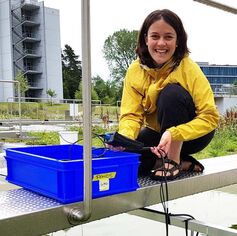
Marta Reyes, MSc - Technician
email: [email protected]
I am an aquatic ecologist, and I am broadly interested aquatic foodweb dynamics and ecosystem processes, as well as in their responses to environmental change. I have worked with several groups of organisms in the past, including fishes and macroinvertebrates, but I am currently most fascinated by the beauty of phytoplankton.
In the Narwani lab, I am currently working on the project NUDREM, where we aim to understand the ecological and evolutionary drivers of the ecosystem stability in 20 outdoor experimental ponds. Over the last few years I have developed extensive skills in algal taxonomy, and I apply these skills in the NUDREM project. I am also working on developing flow cytometry methods, high throuput fluorescence microscopy methods coupled with image classification using machine learning, I train lab robots, and I maintain an algal culture collection for conducting controlled lab experiments.
email: [email protected]
I am an aquatic ecologist, and I am broadly interested aquatic foodweb dynamics and ecosystem processes, as well as in their responses to environmental change. I have worked with several groups of organisms in the past, including fishes and macroinvertebrates, but I am currently most fascinated by the beauty of phytoplankton.
In the Narwani lab, I am currently working on the project NUDREM, where we aim to understand the ecological and evolutionary drivers of the ecosystem stability in 20 outdoor experimental ponds. Over the last few years I have developed extensive skills in algal taxonomy, and I apply these skills in the NUDREM project. I am also working on developing flow cytometry methods, high throuput fluorescence microscopy methods coupled with image classification using machine learning, I train lab robots, and I maintain an algal culture collection for conducting controlled lab experiments.
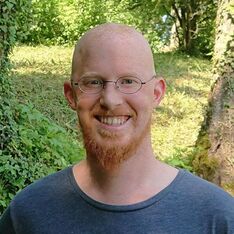
Raphaël Bossart, B.Sc. EFZ - Technician
email: [email protected]
I am helping to establish a robust pillar in molecular biology for the Narwani Group. Being involved in a multitude of projects, I try to understand the different needs of the group and help whenever I can. Currently, I am trying to design primers for amplicon sequencing of phytoplankton marker genes with the aim of understanding genetic change in populations of algae as they change in dominance over time in natural communities. In providing my technical assitance, I am always developing new skills, and I hope to contribute to a better understanding of how evolutionary change contributes to species interactions and community structure in aquatic ecosystems.
email: [email protected]
I am helping to establish a robust pillar in molecular biology for the Narwani Group. Being involved in a multitude of projects, I try to understand the different needs of the group and help whenever I can. Currently, I am trying to design primers for amplicon sequencing of phytoplankton marker genes with the aim of understanding genetic change in populations of algae as they change in dominance over time in natural communities. In providing my technical assitance, I am always developing new skills, and I hope to contribute to a better understanding of how evolutionary change contributes to species interactions and community structure in aquatic ecosystems.
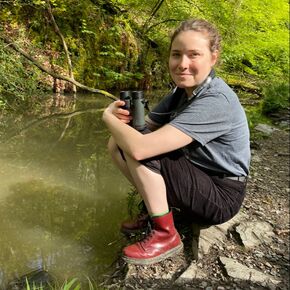
Taylor Norris, MSc. - Scientific Assistant
email: [email protected]
I am a marine biologist turned aquatic biologist with a wide interest of topics spanning from invertebrate ecophysiology to planktonic host-parasite interactions. I received my Bachelor of Science and Masters of Research in marine biology from the University of Plymouth in the UK.
In the Narwani lab, I am working with master’s students, a PhD and Postdoc on temperature and resource competition and dynamics in phytoplankton. I put the skills I learned during my master’s to work with helping to develop experimental design and microscopy and cell counting techniques, I perform mRNA extractions, culture maintenance and cell isolation for the group. I enjoy being able to develop new skills and techniques in a field that I love.
email: [email protected]
I am a marine biologist turned aquatic biologist with a wide interest of topics spanning from invertebrate ecophysiology to planktonic host-parasite interactions. I received my Bachelor of Science and Masters of Research in marine biology from the University of Plymouth in the UK.
In the Narwani lab, I am working with master’s students, a PhD and Postdoc on temperature and resource competition and dynamics in phytoplankton. I put the skills I learned during my master’s to work with helping to develop experimental design and microscopy and cell counting techniques, I perform mRNA extractions, culture maintenance and cell isolation for the group. I enjoy being able to develop new skills and techniques in a field that I love.
